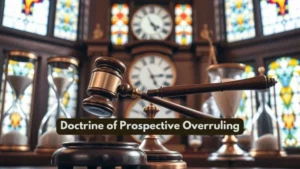In a recent verdict, the Supreme Court underscored that the use of the Doctrine of Prospective Overruling—or assigning future effect to a judgment—should not become a standard approach. The Court must first be convinced that the situation genuinely warrants such an application.

Understanding the Doctrine of Prospective Overruling
This legal principle enables courts to enforce new judicial interpretations only for future cases, leaving past decisions or actions taken under the previous legal understanding unaffected.
It is designed to protect individuals or organizations that relied on the former interpretation of the law from being unfairly penalized after a change in legal reasoning.
Unlike retrospective rulings, which apply new legal standards to both existing and future cases, this doctrine is forward-looking.
It deviates from the traditional Blackstonian philosophy, which viewed the judicial role as one of clarifying the existing law rather than creating new legal principles.
First acknowledged in American courts, the doctrine has since been incorporated into the legal systems of countries such as India and the United Kingdom.
Its main objective is to promote legal certainty and fairness by preserving the integrity of past transactions while accommodating the evolution of legal norms.
Application in Indian Legal System
The Supreme Court of India formally adopted the doctrine in the landmark judgment of I.C. Golaknath v. State of Punjab (1967).
This case marked a significant development in India’s constitutional law, as it was the first instance where the Court applied this doctrine.
Its intent is to prevent the reopening of settled cases and to reduce unnecessary litigation by ensuring that prior actions remain valid.
Subordinate courts are required to implement the new interpretation in future cases only.
In some scenarios, the Supreme Court may also set a specific future date for the new rule to take effect, ensuring that earlier decisions remain undisturbed.
This approach typically occurs when the Court overturns a previous ruling or invalidates a law.




